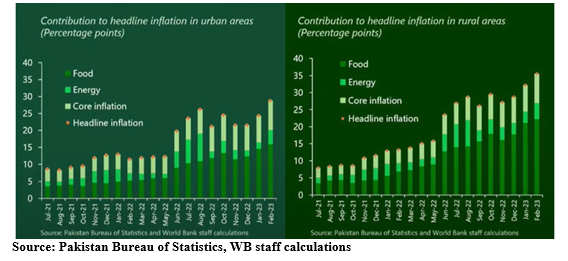INP-WealthPk
Ayesha Mudassar
Pakistan’s inflation rose to a record high during the current fiscal year (2022-23) mainly due to the reversal of energy subsidies, worsening global market conditions, and food supply disruptions due to catastrophic flooding in 2022, said Dr Nadeemul Haque, Vice-Chancellor of Pakistan Institute of Development Economics (PIDE). As per the latest estimates of the Pakistan Bureau of Statistics (PBS), inflation is hovering around a record-breaking 38%.
According to the World Bank’s recent report, the country’s inflation during the first half of the current fiscal year (H1FY23) was recorded at an average of 25% compared to 9.8% during H1FY22. Energy inflation was recorded at 40.6% in urban areas and 41.9% in rural areas during H1FY23, compared to 25.1% and 22.7%, respectively, during H1FY22. The increase in domestic energy prices was attributed to rising global oil prices, weaker exchange rates, and high energy tariffs associated with the reversal of the energy subsidies.
Meanwhile, food inflation sharply grew during H1FY23. Prices of food and non-alcoholic beverages increased greatly, from 9.6% during H1FY22 to 32.2% during H1FY23. Item-wise analysis exhibits that the highest price hike was witnessed for meat, fresh fruits, cooking oil/ghee, pulses, and fresh vegetables. This sharp increase in food prices was primarily due to the torrential rainfall that significantly affected crop output and increased agricultural producers’ input costs. In addition, the higher global food prices together with the local currency depreciation have significantly added to food inflationary pressures.

Both urban and rural energy prices recorded a sudden hike in February 2023, increasing by 37.1% and 37.5%, respectively. Similarly, both urban and food inflation increased significantly, reaching 41.9% and 47%, respectively.
Credit: Independent News Pakistan-WealthPk



